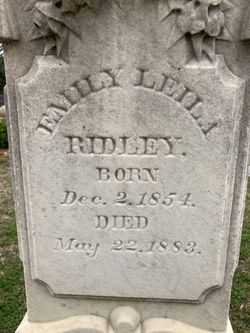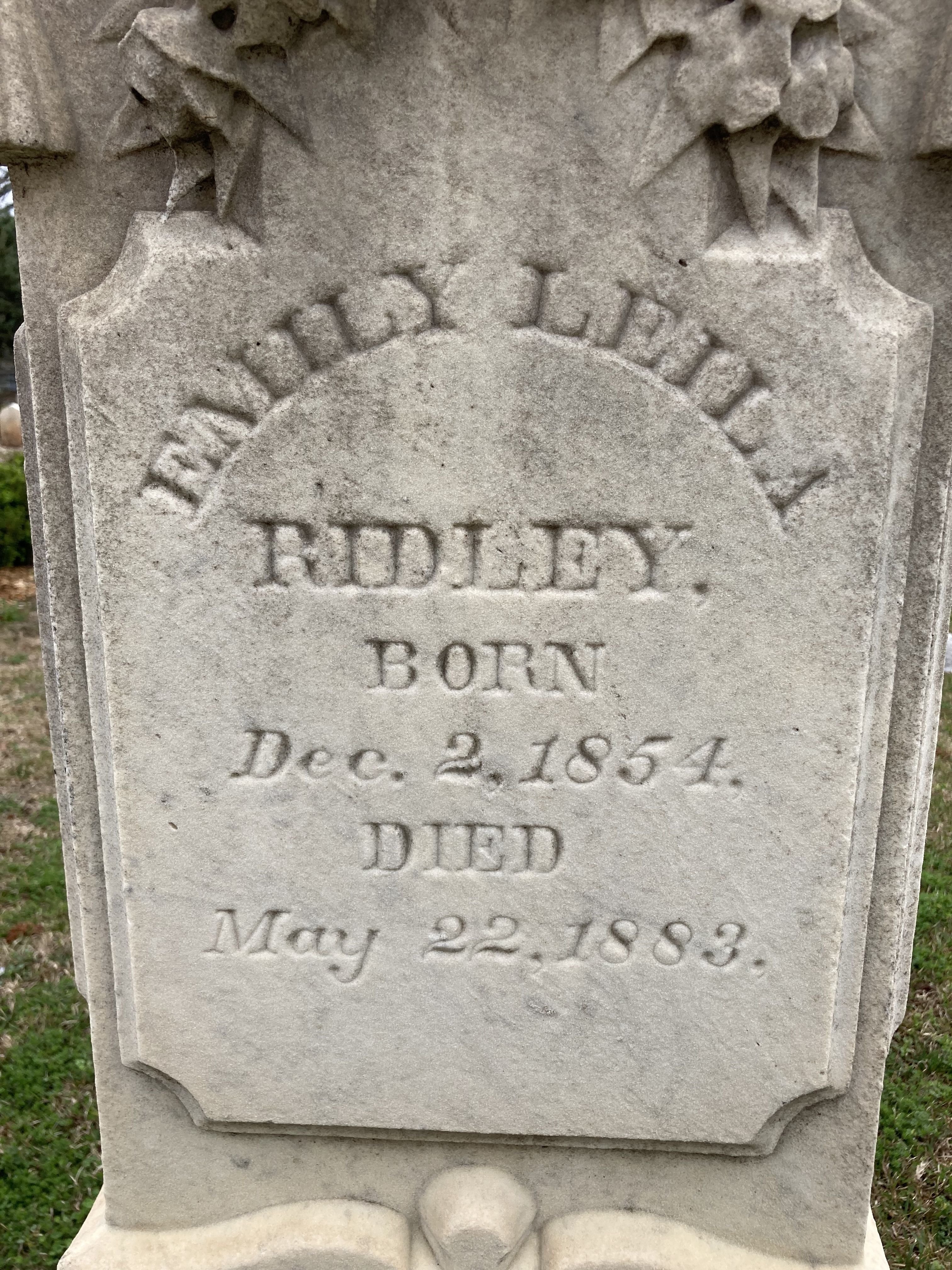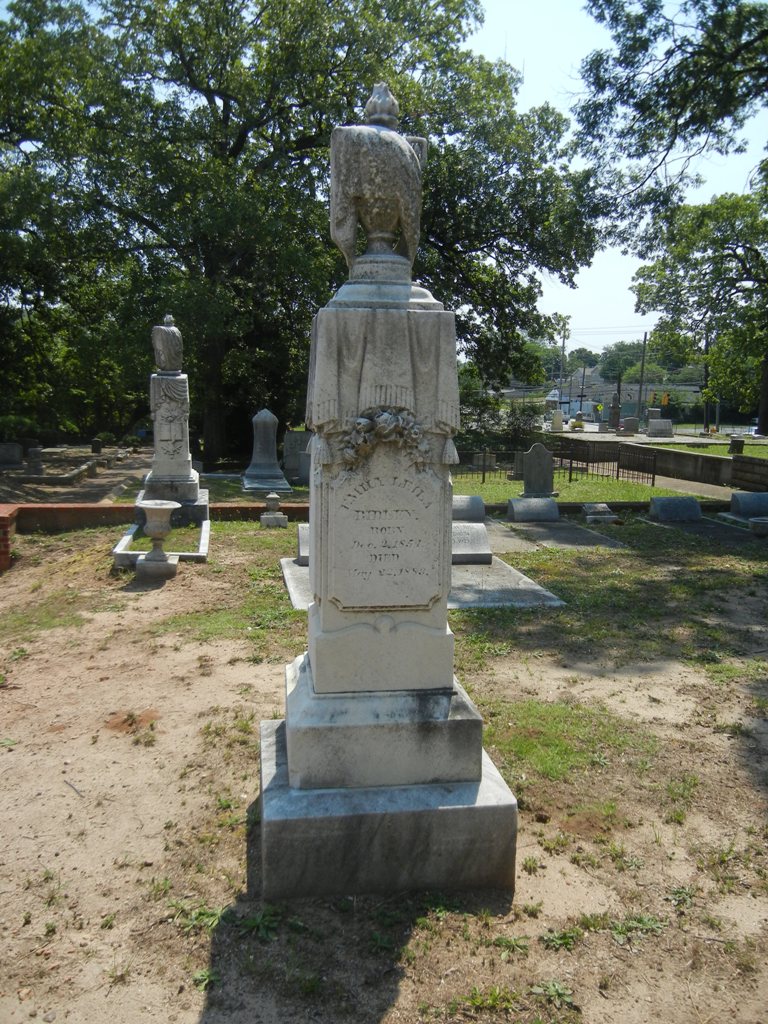____________
5/24/1883 - Atlanta Constitution - It appears that Mrs. Ridley and Miss O'Callaghan were out riding behind a new horse just purchased for Mrs. B. H. Hill, Sr. They had ridden up and down Peachtree and had stopped at Mrs. Ridley's residence, where she confided her child, who had been riding with them, to a nurse and prepared to ride out on the Boulevard. As they were going up the Boulevard, a white man and two negro men cam up the tract driving their horses in a race. It is hard to ascertain exactly what happened but our information is that the men were shouting to their horses and pushing them to the top of their speed. Two of them dashed by on one side of the ladies' carriage and the other on the other side. Their horse frigntened at this unusual rush, sprung forward in a run. The driver, it is said, had caught him up, when the shouting and racing still continuing, he darted off again. Mrs. Ridley and Miss O'Callaghan then sprang from the carriage. Miss O'Callaghan was bruised and her head was cut but she was not seriously hurt. Mrs. Ridley fell on her head, which produced a concussion of the brain. She was lifted up, unconscious and carried into Mr. May's residence, where she still remains. She has never been conscious since. She died just after 2 o'clock.
____________
5/24/1883 - Atlanta Constitution - Earth to Earth - The Funeral services of the Late Mrs. Ridley - The End of a Terrible Accident on the Boulevard - Laid to Rest in Oakland beside the spot where Sleeps Her Distinguished Father, Senator Hill - The Sorrow of Her Friends.
At half past ten o'clock on yesterday the street in front of Dr. Ridley's residence was filled with carriages, that had brought friends who cam to perform the last offices of love for the noble woman who was dead, and to express their sympathy with the bereaved family. The house was crowded with Friends, and there were flowers in simple branches or worked into rare devices in the greatest profusion. Just outside the door, the physicians of the city, with touching thoughtfulness, had gathered, to the number of perhaps 70, and stood in open ranks, and with uncovered heads.
The pallbearers were Messrs. S. M. Inman; R. D. Spalding, T. L. Langston, R. J. Lowry, John Fitten, F. P. Rice, C. E. Harmon, H. C. Jackson, H. W. Grady, W. A. Taylor, W. H. Venable, Harry Jordan, A. Waldo and A. H. Cox. As Dr. Ridley came down the steps, following the coffined remains of the woman he loved so well, with her widowed mother leaning on his arm, his face was sad and restrained. But when he saw the long lines of his comrades, fellow physicians that had turned aside from their busy lives, to assure him of their affection and sympathy, the strong man gave way to his feeling, and his rare courage and self-control was overcome.
The pallbearers ranged themselves alongside the hearse, and the doctors on foot in files of two followed it to the church as an escort. In the church, the first six seats of the center had been reserved for the family, the pallbearers and physicians. The altar was decorated with great taste, huge masses of lillies, snow white doves with outstretched wings and crosses almost hiding it from view. As the minister entered the church, the choir sang, "Jesus Lover of my Soul". General Evans read the lesson and the choir sang, "How Firm a Foundation." General Evans made a tender and touching talk, based on a verse from first Thessalonians: "But I would not have you to be ignorant, brethren, concerning them which are asleep, that ye sorrow not even as those that have no hope.". He portrayed, with loving hand, the virtues and graces of Mrs. Ridley, who he had know and loved from her girlhood and bore a pastor's testimony to the genuineness and sincerity of her good work. He said:
"Only a few days ago I saw a letter full of gentle sympathy and love, written by her to an old school girl friend, who had just lost two lovely little children. Many letters came to this bereaved mother and all were valued hightly, but none more than the message from the heart of the friend of her girlhood. Among other things she said:
"You must remember that we both now have someone in heaven who is waiting for us there - our little ones who have gone before us - and that they are waiting at the gates to welcome us when we come".
"Little did she know," said the preacher, "when she wrote these lines that the pearly gates were already ajar for her, and that the little one, with outstretched hand and eager face was already hurrying over the golden streets to meet her and welcome her to her eternal home."
At the close of General Evan's remarks, Dr. Tucker offered a beautiful and impressive prayer, and the choir then sang "Beyong the Sunset's Radiant Glow" an old song that had always been a favorite one with Mrs. Ridley. Dr. Tucker said that the last word he ever heard Mrs. Ridley say, was to make arrangements to give food and maintenance to a family of poor people.
As the procession left the church, the flowers about the altar were transferred to the hearse, literally covering it. The physicians, in their working buggies, worn with honorable service, went ahead of the hearse, the pall-bearers following. At the special request of Dr. Ridley, Captain May and his family followed the family in the line of mourners. This was in grateful appreciation of the rare and considerate hospitality of Captain and Mrs. May to the guest who was so sadly brought into their house. Had she been their own daughter, they could not have been more sincere or unremitting in their kindness and affection. The line of carriage was the largest, perhaps ever seen in Atlanta.
Mrs. Ridley in two visits to the cemetery, made about a week before her death - one with her mother and the other with Mrs. Howell Jackson - had with particularity selected the spot in which she wished to be buried. It is a few feet to the left of her father's grave and at the foot of a beautiful little tree. Thoughtful friends had preceded the mourners to the grave and its bare walls were covered with flowers. The ceremony in the cemetery was short and simple and at its conclusion the immense crows slowly and sadly dispersed. A few friends remained until the grave was finished and then covered it with the freshest and purest of flowers. When they had finished their work of love, not one inch of the bare dirt was visible. The mound was one mass of lillies, as white as driven snow, and above it two spotless doves were suspended. At the head and foot were double crosses of white and it looked, in the loving eyes of those who left it, with the soft evening sunshine falling on it, emblematic of the pure and radiant woman whose memory it was to perpetuate.
Never, perhaps, in our history, has a death occurred that touched more hearts than this, and the stricken and bereaved family must know that they have the full and universal sympathy of our people.
____________
5/24/1883 - Atlanta Constitution - It appears that Mrs. Ridley and Miss O'Callaghan were out riding behind a new horse just purchased for Mrs. B. H. Hill, Sr. They had ridden up and down Peachtree and had stopped at Mrs. Ridley's residence, where she confided her child, who had been riding with them, to a nurse and prepared to ride out on the Boulevard. As they were going up the Boulevard, a white man and two negro men cam up the tract driving their horses in a race. It is hard to ascertain exactly what happened but our information is that the men were shouting to their horses and pushing them to the top of their speed. Two of them dashed by on one side of the ladies' carriage and the other on the other side. Their horse frigntened at this unusual rush, sprung forward in a run. The driver, it is said, had caught him up, when the shouting and racing still continuing, he darted off again. Mrs. Ridley and Miss O'Callaghan then sprang from the carriage. Miss O'Callaghan was bruised and her head was cut but she was not seriously hurt. Mrs. Ridley fell on her head, which produced a concussion of the brain. She was lifted up, unconscious and carried into Mr. May's residence, where she still remains. She has never been conscious since. She died just after 2 o'clock.
____________
5/24/1883 - Atlanta Constitution - Earth to Earth - The Funeral services of the Late Mrs. Ridley - The End of a Terrible Accident on the Boulevard - Laid to Rest in Oakland beside the spot where Sleeps Her Distinguished Father, Senator Hill - The Sorrow of Her Friends.
At half past ten o'clock on yesterday the street in front of Dr. Ridley's residence was filled with carriages, that had brought friends who cam to perform the last offices of love for the noble woman who was dead, and to express their sympathy with the bereaved family. The house was crowded with Friends, and there were flowers in simple branches or worked into rare devices in the greatest profusion. Just outside the door, the physicians of the city, with touching thoughtfulness, had gathered, to the number of perhaps 70, and stood in open ranks, and with uncovered heads.
The pallbearers were Messrs. S. M. Inman; R. D. Spalding, T. L. Langston, R. J. Lowry, John Fitten, F. P. Rice, C. E. Harmon, H. C. Jackson, H. W. Grady, W. A. Taylor, W. H. Venable, Harry Jordan, A. Waldo and A. H. Cox. As Dr. Ridley came down the steps, following the coffined remains of the woman he loved so well, with her widowed mother leaning on his arm, his face was sad and restrained. But when he saw the long lines of his comrades, fellow physicians that had turned aside from their busy lives, to assure him of their affection and sympathy, the strong man gave way to his feeling, and his rare courage and self-control was overcome.
The pallbearers ranged themselves alongside the hearse, and the doctors on foot in files of two followed it to the church as an escort. In the church, the first six seats of the center had been reserved for the family, the pallbearers and physicians. The altar was decorated with great taste, huge masses of lillies, snow white doves with outstretched wings and crosses almost hiding it from view. As the minister entered the church, the choir sang, "Jesus Lover of my Soul". General Evans read the lesson and the choir sang, "How Firm a Foundation." General Evans made a tender and touching talk, based on a verse from first Thessalonians: "But I would not have you to be ignorant, brethren, concerning them which are asleep, that ye sorrow not even as those that have no hope.". He portrayed, with loving hand, the virtues and graces of Mrs. Ridley, who he had know and loved from her girlhood and bore a pastor's testimony to the genuineness and sincerity of her good work. He said:
"Only a few days ago I saw a letter full of gentle sympathy and love, written by her to an old school girl friend, who had just lost two lovely little children. Many letters came to this bereaved mother and all were valued hightly, but none more than the message from the heart of the friend of her girlhood. Among other things she said:
"You must remember that we both now have someone in heaven who is waiting for us there - our little ones who have gone before us - and that they are waiting at the gates to welcome us when we come".
"Little did she know," said the preacher, "when she wrote these lines that the pearly gates were already ajar for her, and that the little one, with outstretched hand and eager face was already hurrying over the golden streets to meet her and welcome her to her eternal home."
At the close of General Evan's remarks, Dr. Tucker offered a beautiful and impressive prayer, and the choir then sang "Beyong the Sunset's Radiant Glow" an old song that had always been a favorite one with Mrs. Ridley. Dr. Tucker said that the last word he ever heard Mrs. Ridley say, was to make arrangements to give food and maintenance to a family of poor people.
As the procession left the church, the flowers about the altar were transferred to the hearse, literally covering it. The physicians, in their working buggies, worn with honorable service, went ahead of the hearse, the pall-bearers following. At the special request of Dr. Ridley, Captain May and his family followed the family in the line of mourners. This was in grateful appreciation of the rare and considerate hospitality of Captain and Mrs. May to the guest who was so sadly brought into their house. Had she been their own daughter, they could not have been more sincere or unremitting in their kindness and affection. The line of carriage was the largest, perhaps ever seen in Atlanta.
Mrs. Ridley in two visits to the cemetery, made about a week before her death - one with her mother and the other with Mrs. Howell Jackson - had with particularity selected the spot in which she wished to be buried. It is a few feet to the left of her father's grave and at the foot of a beautiful little tree. Thoughtful friends had preceded the mourners to the grave and its bare walls were covered with flowers. The ceremony in the cemetery was short and simple and at its conclusion the immense crows slowly and sadly dispersed. A few friends remained until the grave was finished and then covered it with the freshest and purest of flowers. When they had finished their work of love, not one inch of the bare dirt was visible. The mound was one mass of lillies, as white as driven snow, and above it two spotless doves were suspended. At the head and foot were double crosses of white and it looked, in the loving eyes of those who left it, with the soft evening sunshine falling on it, emblematic of the pure and radiant woman whose memory it was to perpetuate.
Never, perhaps, in our history, has a death occurred that touched more hearts than this, and the stricken and bereaved family must know that they have the full and universal sympathy of our people.
Family Members
Advertisement
Advertisement















